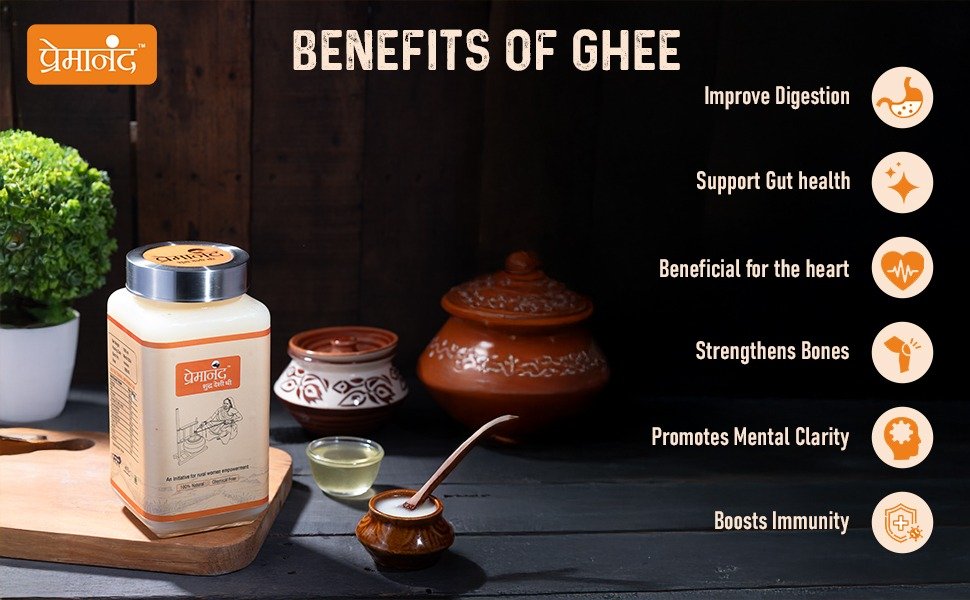Is Ghee Good for Health?
Published on: June 21, 2025

🧈 Is Ghee Good for Health? Here’s What Science and Tradition Say
In Indian households, ghee is not just food—it’s tradition, medicine, and soul-food all in one spoon. But as health-consciousness rises globally, many ask: Is ghee actually good for health? The answer is nuanced—and supported by both modern science and ancient wisdom.
✅ What is Ghee?
Ghee, or clarified butter, is made by simmering butter to remove its water content and milk solids, leaving behind pure butterfat. It's a staple in Ayurveda and is also gaining popularity in Western diets like keto and paleo.
🏥 What Modern Science Says About Ghee
1. Ghee Is Rich in Healthy Fats
Ghee contains:
- Saturated fats: Provide energy and help in the absorption of fat-soluble vitamins (A, D, E, and K).
- Monounsaturated fats (MUFA): Linked to heart health and improved cholesterol levels.
🧾 Harvard Health Publishing notes:
“Dairy fats like those in ghee may not be as harmful as once thought and may even offer benefits when consumed in moderation.”
— Harvard Health
2. Ghee Supports Gut Health
According to the National Institutes of Health (NIH):
“Ghee is a rich source of butyrate, a short-chain fatty acid that plays a key role in gut health, reducing inflammation, and maintaining the integrity of the intestinal wall.”
— NIH Study: Butyrate in human health (PMID: 30308264)
Butyrate is also believed to help with:
- IBS (Irritable Bowel Syndrome)
- Colon health
- Insulin sensitivity
3. Lactose-Free and Shelf Stable
Ghee is lactose-free and casein-free, making it suitable for those with dairy intolerances. It also doesn't spoil easily, even without refrigeration.
🧬 Nutritional Value of Ghee (Per 1 Tablespoon)
| Nutrient | Value |
|---|---|
| Calories | 112 kcal |
| Total Fat | 13g |
| Saturated Fat | 8g |
| Vitamin A | 438 IU (15%) |
| CLA | Trace |
| Butyric Acid | Present |
Data Source: USDA FoodData Central
🕉️ What Ayurveda Says About Ghee
In Ayurveda, ghee is called “Amrita” (nectar of gods) and is believed to:
- Balance Vata and Pitta doshas
- Improve memory and brain function
- Nourish tissues and lubricate joints
- Boost Agni (digestive fire)
“Ghee promotes longevity and rejuvenation (Rasayana). It carries the medicinal properties of herbs deep into tissues.”
— Charaka Samhita, Ayurveda's foundational text
⚠️ Who Should Be Cautious?
- Those with heart disease or high LDL cholesterol should consume in moderation.
- Always prefer pure Bilona Ghee or A2 cow ghee, which retains natural nutrients.
- Avoid vanaspati ghee (hydrogenated fat) which contains trans fats—a real health hazard.
🥄 How Much Ghee Should You Eat?
Most experts recommend:
- 1–2 teaspoons/day for adults
- Cook with ghee instead of refined oils to minimize health risks
“Moderation is key. Ghee can be part of a healthy diet when it replaces other saturated fats or is used sparingly.”
— Dr. Frank Hu, Harvard T.H. Chan School of Public Health
📌 Conclusion: Yes, Ghee Can Be Good for You
Ghee, when consumed responsibly, is:
- ✅ A rich source of essential fats
- ✅ Beneficial for gut and brain health
- ✅ More stable for high-heat cooking than oils like olive oil
- ✅ An integral part of India’s ancient wellness system
Whether you spread it on rotis or add it to your dal, ghee can nourish both body and soul—just don’t overdo it.
Sources:
- NIH - Butyrate and Human Health
- Harvard Health - Butter vs Ghee
- USDA FoodData Central
- Charaka Samhita – Ayurveda

